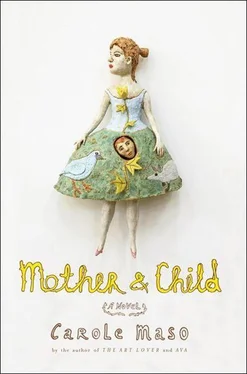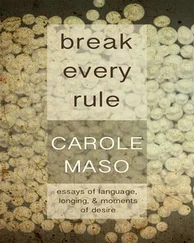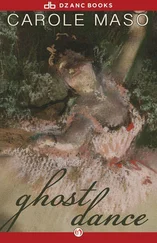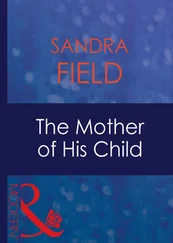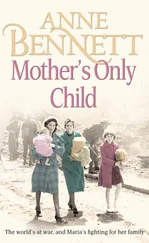Meanwhile the members meditate on the Third Aphorism: Nothing rests, everything moves, everything vibrates.
Everything vibrates?
Not Mimsy, Bunny Boy thinks to himself.

FIVE YEARS PASSED, and the Girl grew and the matted hair was not quite so apparent to human eyes. Civilized, to a point, she put away her witch’s brews and began to search on Match.com, and PlentyofFish, and Cupid.com, and Chemistry.com, and LavaLife for a stepmother. She hoped her white-maned father might oblige.

RUMOR SPREAD IN the Valley about the Girl in the Reading Trance. There was a girl, it seemed, who couldn’t get herself out of her book. She sat in the front of the school bus and sometimes she waved to her classmates as they got on and off, but she herself didn’t move, and though she recognized them as they came and went, she could not make further contact with them.
At night while the others slept in their beds, the girl stayed on the bus in the bus field, and the next day she would wave to her classmates again. Only when the book was over did she get up and stretch her legs a little and get off the bus and look at the stars. Then the girl, lost in the book, accompanied by her dog Shimmer, would jump and play and run by the river.
The next morning the girl would begin another book, and even though it was the same book, each time she read it, a different story emerged, or something she had not seen before came to the fore — for the right book and the right girl are endlessly replenishing. It was the magic of the girl and the book. The children grew old and were replaced by other children, who passed her and waved and grew old, but the girl in the book was eternal and eternally new, and forever all things were possible.
THE PIANO TEACHER arrived all right angles and flying hair, and the child immediately adored her. The piano teacher stood stern over the child and divided the air into beats and measured phrases, and the silence was flooded with music and numbers and beauty. On some occasions, the piano teacher had to stop the child from getting up and dancing. She pressed with her long fingers on the child’s shoulders every time it looked like she might rise up.
More and more the mother felt she had to struggle to stay alive in any room, but not in the room filled with music and the child crooning and the lithe fingers of the piano teacher. In that room for a moment all human genius moved through the child, who was belting out the Ode to Joy as she shimmied on the bench.
The piano teacher revered the great composers and had spent a lifetime with them. The child recognized this from the moment she had stepped into the house. Like the great river, it was a privilege to sit next to her. She handed the child Twinkle, Twinkle Little Star, a child’s version of Mozart to play. Some things vanish, the mother thought, but not all. A few things will never die.
And one day, the teacher said, she would teach her to play Bach.
AT FIRST ALL the children flocked to the side of the tiny crushed girl who was their classmate. In a matter of a weekend she had gone from a tiny, running, laughing girl to a tiny crushed girl in the hospital. The first word had been in the form of a cry heard ringing through the stables. One of her horsey classmates had gotten the news first.
The helicopter came and took the girl away. She had fallen off an enormous horse. As if that were not bad enough, the enormous horse had then fallen and landed on top of her. Word from the hospital where she lay in a world of white was that there was to be one operation and the possibility, sometime later, of another. After a long time, the girl returned to school and the children fought to be near her, to wheel her around the periphery of things and to slip her sweets. They knocked each other down trying to get to the little broken girl first.
Later the children learned from the tiny girl that before she had gotten on the enormous horse for the last time, she had developed a fear of horses, a horse phobia, but her mother urged her back anyway because that is what one did in a new country such as this. The mother who was from a different, sadder country encouraged the girl to get back on the horse, as it was, she said, the American Way. In her first country, it would have been okay not to get on the horse again, but here it was not an option. This made it all the worse, somehow.
And it was only a matter of time before the children tired of the tiny crushed girl — in part because it is how children are, always ready to move on to the next thing, and in part because the tiny girl in her crushedness was becoming a tyrant. No one could give her what she wanted, which was two legs walking again, and so she would demand other things, and after a while when the children saw the big, slowly moving wheels of the wheelchair, they would pivot away and run in the opposite direction before the tiny girl could spot them. Increasingly it was only the girl, her mother, the teacher, and a tiny horse, which had somehow insinuated its way onto the crushed girl’s lap.
In the solitary, increasingly hostile place she finds herself, she tries to recall a time only a short while ago when she felt impervious to pain. In her mind she goes out into the fields in search of an echo from her other life. She works to recall when she had friends for real, and there was pliable ground. Pity this suddenly isolated, crushed child. She yearns for the time before her mother failed her, the time when she ran in the field with the others, the times before she was not broken or crushed — still a whole girl.
THE TEACHER DESPISED the children, a fact that the mother was well aware of, and now the first Parent-Teacher Conference was upon them. The mother entered the room and sat in the small chair and waited for the teacher to speak. All was silent. She had drained the room of all ambient sound so she might hear more precisely every word the teacher had to say.
The teacher believed it was her task to point out what she perceived as the weakness in each of the children and locate it for the parent. She would call one child disingenuous, another dimwitted, yet another ingratiating. She despised each child in his or her own unique way, and she was determined to find a way to slip this disdain casually into the conference, as they sat across from the other on the small chairs. Gleefully the teacher would wait for the perfect chance, the exact right place so as to create the maximum possible shame in the parent. It was this utterly mesmerizing moment in each conference that the teacher lived for; it transfixed and sustained her.
The mother sat silently waiting for the inevitable pronouncement, but while she waited, she isolated the skinny, mean-spirited teacher on the ever-darkening stage of her psyche. Soon in the quiet, the teacher began choking on a fishbone and was forced to excuse herself. While the mother waited, she focused on the small Bunsen burner in the back of the classroom.
When the teacher returned, the mother began her polite inquiry. Where most parents were rendered helpless in the face of the teacher, the mother enjoyed such encounters, as she was not reluctant to assign the word evil where it applied. Identified as such, the mother serenely proceeded.
Woe to the teacher who abuses her station, the mother thought to herself. A teacher possesses great power and so had to be held to a more rigorous standard than others in the community, and as such, a teacher’s trespasses when they come are far greater than most of the trespasses of others. She holds a child’s life and self-esteem in her hands, and as a result, a teacher must always be prepared to pay. Please rise, the mother commanded her, and the teacher, caught off-guard, got to her feet.
Читать дальше
